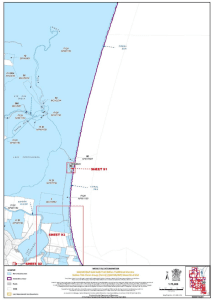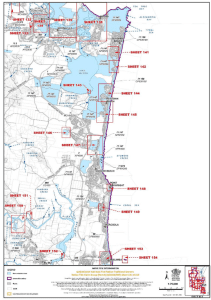The Federal Court has made a determination setting out the non- exclusive native title rights of the Kabi Kabi people to certain lands on the Sunshine Coast. The areas specific to the Noosa State Electorate can be seen on the two (2) maps at the bottom of this article. More maps of specific locations can be found in the court decision document available at www.judgments.fedcourt.gov.au/judgments/Judgments/fca/single/2024/2024fca0645
The Native Title rights are limited to only certain land in the general claim area, and this excludes all freehold land meaning all privately properties, such as homes and businesses are exempt. Native Title covers non-freehold government land such as waterways and lakes, National Parks and other protected areas, cemeteries and some municipal parks.
They are also limited to what rights are provided as they are non-exclusive as mentioned above. Per page ii of the Native Title determination, available at www.judgments.fedcourt.gov.au/judgments/Judgments/fca/single/2024/2024fca0645, the rights are as follows:
(a) access, be present on, move about on and travel over the area;
(b) camp on the area, and for that purpose, erect temporary shelters on the area;
(c) take resources of the area for any purpose;
(d) take and use the Water of the area for personal, domestic and non-commercial communal purposes (including cultural and spiritual purposes);
(e) participate in cultural activities on the area;
(f) be buried and bury Native Title Holders within the area;
(g) maintain places of importance and areas of significance to the Native Title Holders under their laws and customs and protect those places and areas from physical harm;
(h) teach on the area the physical and spiritual attributes of the area;
(i) hold meetings on the area; and
(j) light fires on the area for domestic purposes including cooking, but not for the purpose of hunting or clearing vegetation.
The native title rights and interests are subject to and exercisable in accordance with:
(a) the Laws of the State and the Commonwealth; and
(b) the traditional laws acknowledged and traditional customs observed by the Native Title Holders.
The native title rights and interests do not confer on the Native Title Holders:
(a) possession, occupation, use or enjoyment to the exclusion of all others;
(b) any right to access or take:
(i) minerals or;
(ii) petroleum.
These Native Title rights co-exist with the rights of other land users. The following are Questions and Answers provided by the Queensland Government regarding, which is also available at www.qld.gov.au/firstnations/environment-land-use-native-title/what-it-means-for-queensland:
Can I still access National Parks and Beaches?
In Queensland, public access and use of beaches is not affected by the recognition of native title.
For other land types, if native title is recognised, it doesn’t automatically mean that land can or can’t be accessed. It depends on whether the determination recognised exclusive or non-exclusive native title over that area.
Non-exclusive native title means that the rights and interests recognised can co-exist with others. For example, non-exclusive native title can be recognised over a reserve. This means that:
- visitors can still visit the reserve and its recreation spaces
- native title holders can continue accessing the area to exercise their recognised rights and interests, like gathering traditional foods or protecting significant sites.
Exclusive native title means that native title holders can exercise their native title rights and interests ‘to the exclusion of all others’. This means that other land users must seek the appropriate permission from native title holders to access or use the area.
Will my private property be affected?
In Australian common law, most private homes are under a type of tenure called freehold land. As the name suggests, this means the land is ‘free from hold’ by any other entity and the owner can mortgage, lease, or sell their land and build a dwelling in accordance with local laws and planning regulations.
Native title can’t be recognised over freehold land, and a native title determination won’t affect private home ownership.
How is farming impacted by Native Title?
Non-exclusive native title can be recognised over some kinds of farmland, including pastoral leases.
This means that pastoralists can continue to graze animals, fence land, build dams, and erect homes. At the same time, native title holders can access, use, and enjoy the land according to their traditional laws and customs.
If there’s inconsistency or dispute about the land use, the rights of the pastoralists takes precedence over the rights of the native title holders. However, a pastoralist can’t prevent native title holders from exercising their native title rights, and can’t deny access to native title lands areas.
How is development affected?
Under the Native Title Act, native title holders have a right to negotiate an agreement with government or private corporations who want to develop land, open mines or build infrastructure on land that has a native title determination. This is an important measure that allows native title holders to have input over development that affects their traditional lands and waters. It also means that native title holders can get compensation for allowing industry to access their traditional lands.
The right to negotiate is not a right to veto. Native title holders can’t prevent development unless the site is a cultural heritage site, or the Traditional Owners hold freehold tenure.
Do Native Title holders pay rates and taxes on their native title land?
Native title is not the same as land ownership. It doesn’t let native title holders do the same things that can happen on private freehold land, like building a property. So there aren’t rates or taxes that apply to most lands recognised by native title.
Aboriginal peoples and Torres Strait Islander peoples can apply for a unique type of freehold land called ‘Aboriginal Freehold’ or ‘Torres Strait Islander Freehold’, but this is a title return (land transfer) under the Aboriginal Land Act 1991 (Qld) and the Torres Strait Islander Land Act 1991 (Qld).
With this type of freehold, Aboriginal and Torres Strait Islander people can build homes or commercial buildings. In this case, taxes and rates will apply in the same way as other private land that’s used for commercial or residential purposes.
Does mainstream Australian law apply on native title land?
Native title rights and interests remains subject to Commonwealth, state and local government laws. Aboriginal or Torres Strait Islander people, including those who are native title holders on areas where native title is recognised, need to:
- follow Australian law
- obey police or other law enforcement when required.
In some special circumstances, native title rights might affect how a law applies. For example, if state law requires someone to obtain a hunting permit, this requirement may not apply to native title holders if this hunting is part of exercising a recognised native title right.
The decommissioned TAFE site in Tewantin
As previously reported, due to the decommissioned TAFE site’s ‘unallocated status’, it was subject to waiting for this determination to be made so that the successful proponents, chosen in the Expressions of Interest (EOI) period, completed in 2022, could be made public. Sandy will be working with these proponents and the State Departments to ensure this is actioned as soon as possible. For our previous Noosa 360 updates on the TAFE, please visit www.sandybolton.com/?s=tafe
Clarifications
In response to queries raised regarding mapping discrepancies between Kabi Kabi part A and private freehold land at Noosa North Shore as well as coexisting rights in relation to jetties , the Department of Resources have provided the following clarifications to assist:
Department of Resources (Resources) has investigated the mapping anomalies identified within Queensland Globe. The incorrect position of the Kabi Kabi Part A determination watercourse boundary was of a technical nature and has since been resolved.
Resources confirms that the Kabi Kabi Part A determination does not include private freehold.
The Federal Court’s determination is the legal document which sets out where native title has been recognised at law.
The Kabi Kabi People now have legal recognition of their non-exclusive rights to more than 365 000 hectares of land and waters, meaning their rights coexist with the rights of other land users.
Whilst non-exclusive native title rights have been recognised over the Noosa River, those rights co-exist with the valid rights of other users. For example, if a jetty was constructed with the appropriate approvals/permits, the lawful rights of the jetty owner continue to exist and are not affected by the native title determination.
The Kabi Kabi People do not have a right to prevent access to, or the use of, validly constructed jetties.
In regard to Noosa River and other waterways and local beaches, the following has been provided:
The Federal Court has recognised the Kabi Kabi People’s pre-existing rights to numerous waterways across the determination area. This includes the Noosa River.
The Department of Resources understands that the Noosa Shire Council has prepared a draft Noosa River Plan which is publicly available on Noosa Shire Council’s website. The Kabi Kabi People are noted as stakeholders within the document.
The Native Title Act 1993 (Cth) (NTA) sets out the procedures that governments must follow if they propose to deal with land or waters in a way that may affect native title. For example, the granting of private leases/licences to commercial operators may be considered a dealing that affects native title and there may be procedural processes that need to take place under the NTA before the lease/licence can be lawfully granted.
The Kabi Kabi People have non-exclusive rights to the Noosa River. In practical terms, that means that the Kabi Kabi People can exercise their rights, like accessing the waterways and fishing, however they do not have a native title right to exclude other users. The Kabi Kabi native title rights co-exist with the valid rights of other users. For example, if a jetty was constructed with the appropriate approvals/permits, the lawful rights of the jetty owner continue to exist and are not affected by the native title determination.
There is nothing in the determination that prevents public access to waterways or beaches. In fact, the determination itself confirms existing public access to and enjoyment of beaches and waterways. It also confirms the public right to fish.
The Kabi Kabi People’s native title claim over the northern stretch of Teewah Beach towards Double Island Point has not yet been resolved.
The Federal Court’s determination has recognised the Kabi Kabi People’s pre-existing rights over various beaches throughout the Sunshine Coast area. Generally speaking, these rights have been recognised to the Lowest Astronomical Tide. These distances vary so Resources isn’t able to provide a specific distance.
Whilst the Federal Court has recognised the non-exclusive native title rights of the Kabi Kabi People, those rights still need to be exercised in accordance with the laws of the Commonwealth, State and Local Governments. The Kabi Kabi People‘s ability to camp and light fires for cooking purposes within the national park areas or on the beaches will remain subject to relevant legislation which regulates those activities.
The Noosa Shire Council and Sunshine Coast Council are parties to the Kabi Kabi Part A determination.
Spatial layers showing the Kabi Kabi Part A determination area can be accessed via Queensland Globe: information.qld.gov.au/qldglobe/public/kabi-kabi-determination-data-part-a-0
Queensland Globe is an interactive platform and users can zoom into areas of interest to understand where native title has been determined to exist.
Further information
We continue to update our community as we find information however Native Titles claims and determinations are made under Federal Government legislation, and State Members of Parliament (MP’s) have no jurisdiction in them. Our previous Noosa 360 updates are available at www.sandybolton.com/?s=Native+Title.
For any queries relating to Native Title, please contact your local Federal MP.
- Wide Bay Federal Electorate – Llew O’Brien – llew.obrien.mp@aph.gov.au
- Fairfax Federal Electorate – Ted O’Brien – ted.obrien.mp@aph.gov.au


